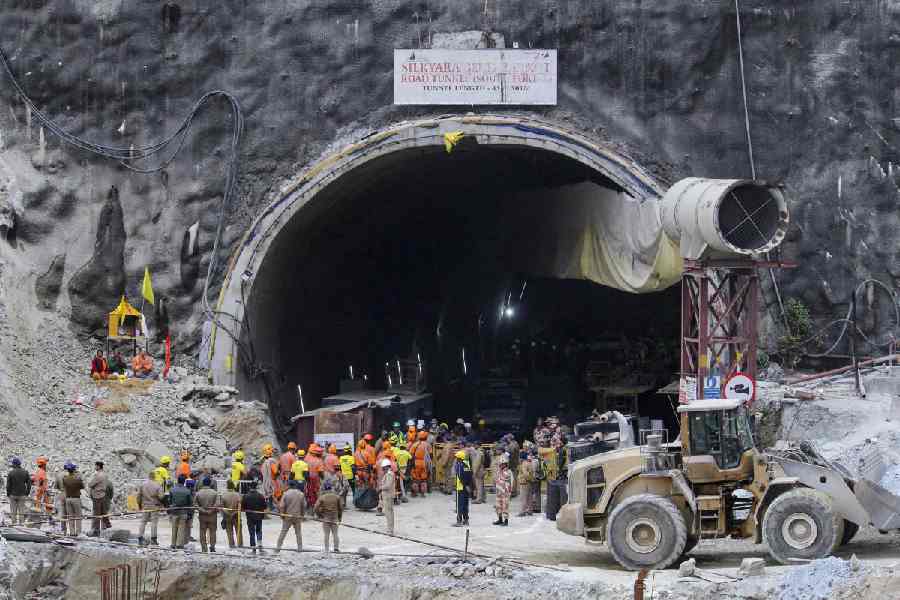The 4.5 kilometres long Silkyara tunnel project in Uttarakhand, which is part of the central government's strategic 900-km 'Char Dham Yatra All Weather Road', will continue after the necessary safety audit and repair of the broken structure, a senior road ministry official said on Wednesday.
The ambitious Rs 12,000-crore project aims to provide all-weather connectivity to four holy towns of Yamunotri, Gangotri, Kedarnath and Badrinath in Uttarakhand.
A rescue team on Tuesday pulled out all 41 workers trapped under the collapsed portion of the under-construction Silkyara tunnel in a multi-agency operation that hovered between hope and despair for almost 17 days.
"In fact, the safety audit of the Silkyara tunnel will be conducted. Meanwhile, efforts will be made to repair and rectify the broken structure.
"The necessary precautions will be taken and the 4.5 km long tunnel project will continue," the official who was part of the rescue team told PTI.
Another senior official of the Road Transport and Highways Ministry (MoRTH) on the condition of anonymity said, "We will have a thorough review of Silkyara tunnel project and we will improvise some systems also." The official also said that the Silkyara tunnel collapse was an 'accident'.
He said the Uttarakhand government has formed a six-member expert committee to study the causes of collapse.
The MoRTH will decide later if a committee be formed to investigate the cause of the collapse, the official added.
Speaking with PTI, Zojila Tunnel Project Head Harpal Singh said there could be several possible reasons for the collapse of the Silkyara tunnel.
"These could be poor geological investigation, under-designed ground support systems, mistakes during construction, poor data monitoring and mitigation measures during construction or poor supervision control," he explained.
Singh was of the view that "all highway and rail tunnels should be planned with an escape tunnel parallel to the main tunnel".
The strategic Zojila tunnel - an all-weather link between the Kashmir valley and the Ladakh region -- is being constructed by Megha Engineering and Infrastructures Ltd (MEIL).
In 2021, in an interview with PTI, Union road transport and highways minister Nitin Gadkari had termed allegations that the Char Dham road project triggered landslides in Uttarakhand as 'misinformation' and asserted that the government is sensitive about ecology and environment while carrying out development projects.
Gadkari pointed out that now, the hilly terrains have been secured with the construction of a tunnel (beneath Chamba town).
A 2019 report headed by veteran environmentalist Ravi Chopra described the Char Dham project -- an ongoing road project that will connect the four important pilgrim towns of Badrinath, Kedarnath, Gangotri, and Yamunotri -- as "an assault on the Himalayas".
The committee recommended limiting the width of the road to 5.5 metres on the Char Dham project. However, in December 2021, the Supreme Court in its order allowed the road width to 10 metres.
The Supreme Court allowed double-lane widening of the Char Dham highway project in Uttarakhand, observing that the country's security concerns may change over time and the recent past has thrown serious national security challenges.
The judgment clearing the way for a double-lane paved shoulder (DL-PS) configuration for the project had come in the backdrop of the standoff between Indian and Chinese militaries in several areas along the LAC (line of actual control) in Ladakh.
"The considerations for development of national highways in plains and in hilly and mountainous regions are not identical," it had noted.
Prime Minister Narendra Modi laid the foundation stone of the 'Char Dham Yatra All Weather Road Project' on December 27, 2016.
The original deadline for the project was March 2020.
Except for the headline, this story has not been edited by The Telegraph Online staff and has been published from a syndicated feed.











